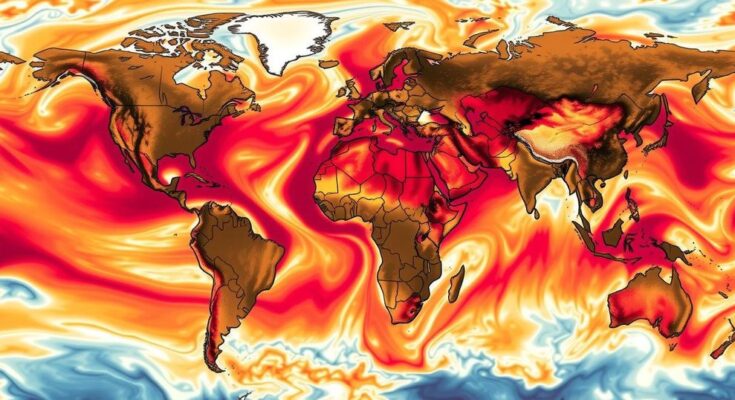2024 has been identified as the warmest year on record with a global temperature increase of 2.32 degrees Fahrenheit above the 20th-century average. Antarctic sea ice coverage has fallen to its second lowest extent, while upper ocean heat content reached unprecedented levels. The global climate indicators align with findings from other scientific organizations that underline the urgency of addressing climate change.
In 2024, the world officially recorded its warmest year ever, according to a comprehensive analysis from the National Oceanic and Atmospheric Administration (NOAA) National Centers for Environmental Information (NCEI). The average temperature across the planet’s land and ocean surfaces was noted to be 2.32 degrees Fahrenheit (1.29 degrees Celsius) above the 20th-century average, surpassing the previously hottest year, 2023, by 0.18 degrees Fahrenheit (0.10 degrees Celsius). Notably, Africa, Europe, North America, Oceania, and South America all experienced their warmest years on record this year. Meanwhile, the Arctic and Asia recorded their second warmest years since data collection began in 1850.
The decline of Antarctic sea ice has also become a significant concern, with coverage reaching its second lowest extent recorded, averaging 4.00 million square miles in 2024. The maximum Antarctic sea ice in September registered 6.59 million square miles, while the minimum extent in February dropped to 830,000 square miles. This decrease is juxtaposed with Arctic sea ice conditions, where the average extent of 4.03 million square miles positioned it seventh lowest, indicating alarming trends in polar ice diminishment.
Additionally, upper ocean heat content, a crucial climate indicator, peaked at record levels, marking the highest recorded heat concentration in the upper 2,000 meters of the ocean. Given that oceans absorb about 90% of excess heat in the Earth’s climate system, this statistic underscores the severity of climate change. Furthermore, global tropical cyclone activity appears to have remained near average, with 85 named storms in 2024, slightly below the historical average of 88.
The findings of this report align with similar analyses conducted by other scientific organizations, including NASA and the Copernicus Climate Change Service, which similarly conclude that 2024 was the hottest year on record.
The increasing global temperatures have raised concerns among scientists and environmentalists, with implications for climate patterns, ecosystems, and human well-being. As greenhouse gas emissions continue to rise, years of accumulating data have begun to constrain the extent of these temperature increases, leading to unprecedented shifts in weather patterns, ice melt, and sea-level rise. The monitoring of sea ice levels and ocean temperatures provides critical insight into Earth’s climatic health, indicating how human activity is influencing the planetary system overall. The NOAA NCEI plays a vital role in tracking these changes, helping to inform policy and public awareness efforts to combat climate change.
In summary, the year 2024 marked a significant milestone as the hottest year on record, highlighting the urgent need for collective action against climate change. The declines in Antarctic sea ice coverage and the alarming increases in ocean heat content further emphasize the severity of our current climate crisis. As global temperatures continue to rise, understanding these developments is crucial to mitigating future impacts on the planet, ecosystems, and society.
Original Source: www.noaa.gov




